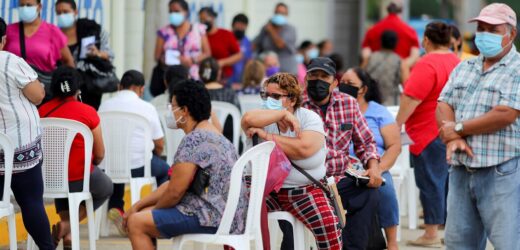By Daniel Politi
Covid-19 cases are increasing in many Central American and Caribbean countries, officials from the World Health Organization warned on Wednesday as they called on richer nations to step up vaccine donations to a region where immunization rates remain perilously low.
The Americas have become “a region divided by vaccine access,” said Dr. Carissa Etienne, the director of the Pan American Health Organization, which is part of the W.H.O.
Countries with higher rates of vaccination, including Costa Rica, Uruguay and Chile, are seeing sharp drops in cases, while others are experiencing vastly different realities.
Only 15 percent of people across Central America and the Caribbean have been fully vaccinated against Covid-19, and in some countries, including Honduras and Haiti, the figure is less than 1 percent.
Several Caribbean nations are seeing a rise in cases, including Cuba, where infections and deaths have been soaring and which saw a recent outbreak of street protests against the government, the largest in decades.
“Cuba is currently seeing the highest number of confirmed cases of Covid-19” in the region, said Ciro Ugarte, the director of health emergencies at the Pan American Health Organization. In a population of less than 12 million, more than 43,000 new cases were reported for the current week, up 21 percent from the week before, and the authorities have confirmed that the highly contagious Delta variant is circulating in several provinces.
Other Caribbean nations are also reporting surges. Cases in Martinique, for example, have tripled over the past week, many involving “young people in their 20s,” Dr. Etienne said.
Most Central American countries are also seeing a sharp rise in coronavirus cases, with Guatemala reporting high rates of hospitalizations and neighboring Honduras seeing a spike in cases along its border. There are also hot spots in Amazonian states in Colombia and Peru.
“Covid-19 remains entrenched within our region, particularly in countries with low vaccination coverage, and the spread of variants only makes matters worse,” Dr. Etienne said.
There was a rare bit of good news out of Haiti, which has been engulfed in political unrest since the assassination of its president two weeks ago. Vaccinations against Covid-19 finally began there on Friday, two days after the country received 500,000 doses of the Moderna vaccine donated by the United States through the Covax vaccine-sharing mechanism.
“We clearly need more vaccines and we need them now,” Dr. Etienne said, adding that donations “are really the only way for many countries in our region to secure the doses that they need quickly.”
The U.S. government has vowed to donate around 12 million doses to Latin America and the Caribbean, and has already delivered some 4.5 million doses to Honduras, El Salvador, Bolivia and Haiti.
Officials also expect to receive doses from Spain and Canada, and are optimistic that others, including France, will join the donation effort.
“We want to commend all countries for sharing vaccines with our region, but the truth is, we need more,” Dr. Etienne said. “Please don’t wait until you have surplus doses. Vaccines are not a privilege for the few, they are the right of everybody.”
Site Index
Site Information Navigation
Source: Read Full Article



